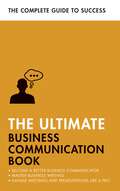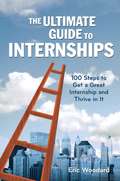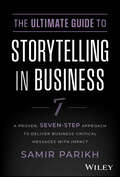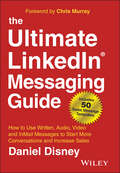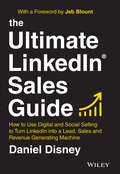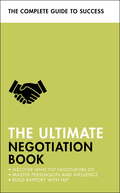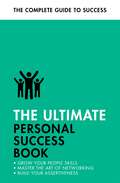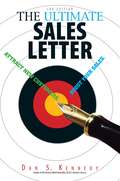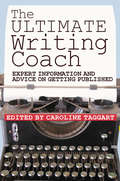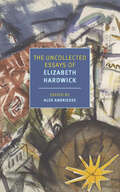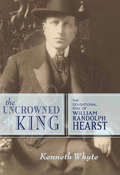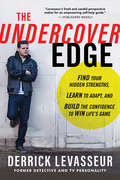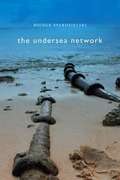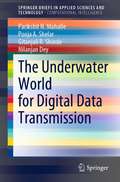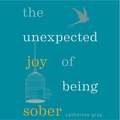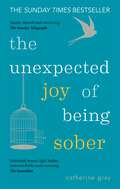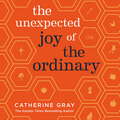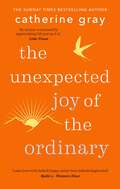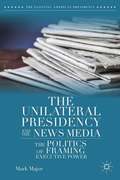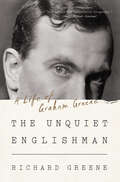- Table View
- List View
The Ultimate Business Communication Book: Communicate Better at Work, Master Business Writing, Perfect your Presentations
by David Cotton Martin Manser Matt Avery Di McLanachanIf you want to be the best, you have to have the right skillset.From effective business writing and presentations to running productive meetings, THE ULTIMATE BUSINESS COMMUNICATION BOOK is a dynamic collection of tools, techniques, and strategies for success.Discover the main themes and key ideas, and bring it all together with practical exercises.This is your complete course in business communication.ABOUT THE SERIESULTIMATE books are for managers, leaders, and business executives who want to succeed at work. From marketing and sales to management and finance, each title gives comprehensive coverage of the essential business skills you need to get ahead in your career. Written in straightforward English, each book is designed to help you quickly master the subject, with fun quizzes embedded so that you can check how you're doing.
The Ultimate Guide to Internships: 100 Steps to Get a Great Internship and Thrive in It (Ultimate Guides)
by Eric WoodardDiscover the seminal book on turning your internship experience into a career-building launchpad for your future. Author Eric Woodard, who got his start as a star intern in the White House, has mentored hundreds of interns as they transition in their careers to something bigger and better. In these pages he lays out the basics of the internship game, the questions to ask when applying, and the best courses of action for turning an internship into a desirable career. Whether you’re still in school, looking for a job after college, or this is your third career change, The Ultimate Guide to Internships will give you excellent professional guidance on getting to the next level, expertly covering such topics as: Identifying internships that will serve your personal career goals Distinguishing yourself as an applicant Knowing what to expect on the job Impressing your employer and superiors Networking effectively in the work environment Preparing yourself for any obstacles Transitioning to a full-time job And many more!Told with humor and honesty, Eric’s advice always focuses on how to make the most of your position, be your best self, exceed others’ expectations, and proudly stand out as the best intern in the office. For anyone who is ready to start their dream career, let The Ultimate Guide to Internships be your handbook as you begin your journey forward, one step at a time.Allworth Press, an imprint of Skyhorse Publishing, publishes a broad range of books on the visual and performing arts, with emphasis on the business of art. Our titles cover subjects such as graphic design, theater, branding, fine art, photography, interior design, writing, acting, film, how to start careers, business and legal forms, business practices, and more. While we don't aspire to publish a New York Times bestseller or a national bestseller, we are deeply committed to quality books that help creative professionals succeed and thrive. We often publish in areas overlooked by other publishers and welcome the author whose expertise can help our audience of readers.
The Ultimate Guide to Storytelling in Business: A Proven, Seven-Step Approach To Deliver Business-Critical Messages With Impact
by Samir ParikhA one-stop shop for everything that you need to know about storytelling in business. How often have you had to deliver a pitch, convey a message or empower an audience with only one chance to get it right? Perhaps a job interview, an important sales presentation, or the announcement of major changes within your organization? Have you ever had a powerful idea that was never adopted because your peers didn’t recognize its value? Storytelling is mission-critical to the advancement of our careers and our businesses. In the book, you’ll learn how to create compelling presentations, write persuasive reports, and convey important messages in meetings with stories that capture the attention of your audiences. The author explains how to convey complex ideas with simplicity, win the acceptance of others, speed up decision-making, and demonstrate your contributions as a thought leader. You’ll discover: A proven methodology, based on seven steps, enabling you to build and deliver stories in a structured, reliable and repeatable way. The importance of creating a one-page story blueprint to road-test your story. How the subtle use of emotional triggers will help you to control the reactions of your audience. A rich library of industry examples, from multi-million dollar sales opportunities to strategic change initiatives, the introduction of new business models and the launch of ground-breaking technical ideas. A 23-point checklist to ensure that you are ready for your next storytelling endeavor. Perfect for managers, directors, executives, as well as early career professionals, The Ultimate Guide to Storytelling in Business is a can’t-miss resource for generating impact and getting your ideas recognized.
The Ultimate LinkedIn Messaging Guide: How to Use Written, Audio, Video and InMail Messages to Start More Conversations and Increase Sales
by Daniel DisneyGet people to read, listen to, and watch your LinkedIn messages The Ultimate LinkedIn Messaging Guide is for salespeople, businesses, recruiters, and LinkedIn users who struggle to get replies and results on the essential business platform. In this book, author Daniel Disney shows you just how powerful LinkedIn can be when you figure out how to do it right. You’ll discover how to use LinkedIn messages to get noticed by employers, get attention to your business, and close deals. When you master LinkedIn messaging with the proven tips inside this book, you’ll be able to start more conversations, create more opportunities and drive more sales and revenue. What you’re looking for is out there – if you know how to reach the people who can help. But in this age of information overload, no one will respond to a spammy message, call, or e-mail. You need to stand out and prove that you’re legitimate. In this book, you’ll find real examples of successful messages, as well as over 50 message templates and scripts for written, audio, video and InMail messages. There are also QR codes throughout the book that take you to recorded examples of video and audio messages so you can see and hear them in action. Learn how to send personalised connection requests and LinkedIn messages that prompt people to talk to you Discover tips for building your network and reaching the decision makers at any company Leverage the power of audio and video messages to connect more effectively on LinkedIn Follow up and convert replies into sales, job offers, and high-value relationshipsIf you’ve struggled to get noticed, meet the right people, and close deals, The Ultimate LinkedIn Messaging Guide is the tool you need to turn it around.
The Ultimate LinkedIn Sales Guide: How to Use Digital and Social Selling to Turn LinkedIn into a Lead, Sales and Revenue Generating Machine
by Daniel DisneyBecome a LinkedIn power user and harness the potential of social selling With the impact of COVID, remote working has become big, and so has the use of digital/virtual sales tools. More sales teams want and need to understand how to use social media platforms like LinkedIn to sell, and most do not use it properly. The Ultimate LinkedIn Sales Guide is the go-to book and guide for utilizing LinkedIn to sell. It covers all aspects of social and digital selling, including building the ultimate LinkedIn profile, using the searching functions to find customers, sending effective LinkedIn messages (written, audio & video), creating great content that generates sales, and all the latest tips and tricks, strategies and tools. With the right LinkedIn knowledge, you can attract customers and generate leads, improving your sales numbers from the comfort and safety of your computer. No matter what you are selling, LinkedIn can connect you to buyers. If you’re savvy, you can stay in touch with clients and generate more repeat sales, build trust, and create engaging content that will spread by word-of-mouth—the most powerful sales strategy around. This book will teach you how to do all that and more. In The Ultimate LinkedIn Sales Guide you will learn how to: Use the proven 4 Pillars of Social Selling Success to improve your existing LinkedIn activities or get started on a firm footing Create the Ultimate LinkedIn Profile, complete with a strong personal brand that could catapult you to industry leader status Generate leads using LinkedIn, then build and manage relationships with connected accounts to turn those leads into customers Utilize little-known LinkedIn “power tools” to grow your network, send effective messages, and write successful LinkedIn articles And so much more! The Ultimate LinkedIn Sales Guide is a must read for anyone wishing to utilise LinkedIn to improve sales.
The Ultimate Negotiation Book: Discover What Top Negotiators Do; Master Persuasion and Influence; Build Rapport with NLP
by Peter Fleming Mo Shapiro Di McLanachanIf you want to be the best, you have to have the right skillset. From influencing and persuading to choosing a negotiating style and using NLP, THE ULTIMATE NEGOTIATION BOOK is a dynamic collection of tools, techniques, and strategies for success. Discover the main themes and key ideas, and bring it all together with practical exercises.This is your complete course in negotiation. ABOUT THE SERIESULTIMATE books are for managers, leaders, and business executives who want to succeed at work. From marketing and sales to management and finance, each title gives comprehensive coverage of the essential business skills you need to get ahead in your career. Written in straightforward English, each book is designed to help you quickly master the subject, with fun quizzes embedded so that you can check how you're doing.
The Ultimate Negotiation Book: Discover What Top Negotiators Do; Master Persuasion and Influence; Build Rapport with NLP
by Peter Fleming Mo Shapiro Di McLanachanIf you want to be the best, you have to have the right skillset. From influencing and persuading to choosing a negotiating style and using NLP, THE ULTIMATE NEGOTIATION BOOK is a dynamic collection of tools, techniques, and strategies for success. Discover the main themes and key ideas, and bring it all together with practical exercises.This is your complete course in negotiation. ABOUT THE SERIESULTIMATE books are for managers, leaders, and business executives who want to succeed at work. From marketing and sales to management and finance, each title gives comprehensive coverage of the essential business skills you need to get ahead in your career. Written in straightforward English, each book is designed to help you quickly master the subject, with fun quizzes embedded so that you can check how you're doing.
The Ultimate Personal Success Book: Make an Impact, Be More Assertive, Boost your Memory
by Christine Harvey Jonathan Hancock Dena Michelli Alison StrawIf you want to be the best, you have to have the right skillset.From people skills and effective networking to building assertiveness and mastering memory techniques, THE ULTIMATE PERSONAL SUCCESS BOOK is a dynamic collection of tools, techniques, and strategies for success.Discover the main themes and key ideas, and bring it all together with practical exercises.This is your complete course in personal success.ABOUT THE SERIESULTIMATE books are for managers, leaders, and business executives who want to succeed at work. From marketing and sales to management and finance, each title gives comprehensive coverage of the essential business skills you need to get ahead in your career. Written in straightforward English, each book is designed to help you quickly master the subject, with fun quizzes embedded so that you can check how you're doing.
The Ultimate Personal Success Book: Make an Impact, Be More Assertive, Boost your Memory
by Christine Harvey Jonathan Hancock Dena Michelli Alison StrawIf you want to be the best, you have to have the right skillset.From people skills and effective networking to building assertiveness and mastering memory techniques, THE ULTIMATE PERSONAL SUCCESS BOOK is a dynamic collection of tools, techniques, and strategies for success.Discover the main themes and key ideas, and bring it all together with practical exercises.This is your complete course in personal success.ABOUT THE SERIESULTIMATE books are for managers, leaders, and business executives who want to succeed at work. From marketing and sales to management and finance, each title gives comprehensive coverage of the essential business skills you need to get ahead in your career. Written in straightforward English, each book is designed to help you quickly master the subject, with fun quizzes embedded so that you can check how you're doing.
The Ultimate Sales Letter
by Dan S. KennedyThe Ultimate Sales Letter, 3rd Edition shows you how to write letters that get read, generate leads, and make money.
The Ultimate Sales Letter 3rd Editon E-Book: Attract New Customers. Boost Your Sales
by Dan S KennedyWrite Well to Sell Big!In the age of e-mail and instant communication, great sales copy is indispensable to closing a deal. But too many sales letters end up in the junk file or the wastebasket. In this new edition of his top-selling book, author Dan Kennedy explains why some sales letters work and most don't. And he shows how to write copy that any business can use.Among other things, he provides:Completely updated text and examplesGreat headline formulasNew exercises to spark creativityThe best way to use graphicsKennedy is the most successful, highly paid direct-response copywriter in the country. In this book, he shares his step-by-step formula so everyone can write letters that will nail the sale.
The Ultimate Writing Coach: Expert Information and Advice on Getting Published
by Caroline TaggartThe Ultimate Writing Coach contains everything you need to know about writing and publishing. It presents authoritative guidance direct from professional writers covering the full gamut of both the fiction and non-fiction market. For fiction, there is coaching on everything from creating believable characters and writing short stories to specialist subjects such as crime and children's fiction. For non-fiction learn from expert advice on travel and technical writing, writing for the web, poetry and biographical writing, and journalism. This invaluable guide also includes succinct, practical guidance on actually getting published, with articles on how to get your submission right for immediate impact, contracts and legal issues, and the financial side.There are handy tips on learning opportunities, whether you're a high school graduate looking to embark on a university degree or a full-time mom looking to take a short course or workshop. And a handy glossary of book trade terminology will ensure you're fully clued up on your industry jargon.
The Uncollected Essays of Elizabeth Hardwick
by Elizabeth HardwickEssays on music, art, pop culture, literature, and politics by the renowned essayist and observer of contemporary life, now collected together for the first time. The Uncollected Essays of Elizabeth Hardwick is a companion collection to The Collected Essays, a book that proved a revelation of what, for many, had been an open secret: that Elizabeth Hardwick was one of the great American literary critics, and an extraordinary stylist in her own right. The thirty-five pieces that Alex Andriesse has gathered here—none previously featured in volumes of Hardwick&’s work—make it clear that her powers extended far beyond literary criticism, encompassing a vast range of subjects, from New York City to Faye Dunaway, from Wagner&’s Parsifal to Leonardo da Vinci&’s inventions, and from the pleasures of summertime to grits soufflé. In these often surprising, always well-wrought essays, we see Hardwick&’s passion for people and places, her politics, her thoughts on feminism, and her ability, especially from the 1970s on, to write well about seemingly anything.
The Uncrowned King: The Sensational Rise of William Randolph Hearst
by Kenneth WhyteA lively, unexpected, and impeccably researched piece of popular history, The Uncrowned King reveals how an unheralded young newspaperman from San Francisco arrived in New York and created the most successful daily of his time, pushing the medium to an unprecedented level of influence and excitement, and leading observers to wonder if newspapers might be "the greatest force in civilization," more powerful even than kings and popes and presidents.Featuring an eight-page insert of black and white photographs, The Uncrowned King offers a window onto the media world at the turn of the 19th century, as seen by its most successful and controversial figure, William Randolph Hearst. Kenneth Whyte's anecdotal, narrative style chronicles Hearst's rivalry with Joseph Pulitzer, the undisputed king of New York journalism, in the most spectacular newspaper war of all time. They battled head-to-head for three years, through the thrilling presidential election campaign of 1896 and the Spanish-American War-a conflict that Hearst was accused of fomenting and that he covered in person. By 1898, Hearst had supplanted Pulitzer as the dominant force in New York publishing, and was well on his way to becoming one of the most powerful and fascinating private citizens in 20th-century America.
The Undercover Edge: Find Your Hidden Strengths, Learn to Adapt, and Build the Confidence to Win Life's Game
by Derrick LevasseurIn a televised social experiment before millions of viewers, police sergeant Derrick Levasseur demonstrated that techniques used by undercover detectives could help people achieve their goals in everyday social situations. The result: he walked away with more than half a million dollars.In The Undercover Edge, Derrick shares his personal mind-set surrounding human behavior and motivation. Even more than that, he provides easy yet groundbreaking tools acquired while overcoming personal adversity and working more than a decade in law enforcement, showing readers: The power of observation and creating a profile The effect of using silence to extract and evaluate information The benefits of interpreting body language and developing your sixth sense The importance of self-awareness and adapting to your environment The value of developing a personal ops plan with a defined missionDerrick's approach allows readers to create a solid foundation in their lives, build confidence personally and professionally, and push themselves to become stronger, more capable leaders.
The Undersea Network
by Nicole StarosielskiIn our "wireless" world it is easy to take the importance of the undersea cable systems for granted, but the stakes of their successful operation are huge, as they are responsible for carrying almost all transoceanic Internet traffic. In The Undersea Network Nicole Starosielski follows these cables from the ocean depths to their landing zones on the sandy beaches of the South Pacific, bringing them to the surface of media scholarship and making visible the materiality of the wired network. In doing so, she charts the cable network's cultural, historical, geographic and environmental dimensions. Starosielski argues that the environments the cables occupy are historical and political realms, where the network and the connections it enables are made possible by the deliberate negotiation and manipulation of technology, culture, politics and geography. Accompanying the book is an interactive digital mapping project, where readers can trace cable routes, view photographs and archival materials, and read stories about the island cable hubs.
The Underwater World for Digital Data Transmission (SpringerBriefs in Applied Sciences and Technology)
by Nilanjan Dey Parikshit N. Mahalle Gitanjali R. Shinde Pooja A. ShelarThis book covers all small details about Underwater Sensor Networks (UWSN). Researchers can use this book as a prerequisite before starting any research on underwater networks or underwater applications. This book covers the introduction, challenges, different architectural models for UWSN, various attacks on UWSN, underwater applications, and networking layers. The target audience includes professors and students in engineering, and researchers and engineers working on marine applications. In academic level, the book is helpful for students having Networking and Information Security as elective subject and doing projects in Wireless Networks. It is also helpful for spostgraduates and Ph.D. researchers to learn basics of Underwater Sensor Networks.
The Unexpected Joy of Being Sober: THE SUNDAY TIMES BESTSELLER
by Catherine GrayTHE SUNDAY TIMES BESTSELLER 'Gray's tale of going sober is uplifting and inspiring' - The Evening Standard 'An icon of the Quit Lit movement' - Condé Nast Traveller 'Fascinating' - Bryony Gordon 'Not remotely preachy' - The Times 'Jaunty, shrewd and convincing' - Sunday Telegraph 'Admirably honest, light, bubbly and remarkably rarely annoying' - Alice O'Keeffe, Guardian 'Truthful, modern and real' - Stylist 'Brave, witty and brilliantly written' - Marie Claire 'The Unexpected Joy of Being Sober came to me at a time when I much needed it... The book became my best friend, and got me through, and took me on a journey.' - Sadie Frost 'Particularly lovely, because it's not a deep and dark dive into someone's terrible addiction. It's a celebration of everything that she has gained from not drinking' - Laura Donnelly Ever sworn off alcohol for a month and found yourself drinking by the 7th? Think there's 'no point' in just one drink? Welcome! There are millions of us. 64% of Brits want to drink less.Catherine Gray was stuck in a hellish whirligig of Drink, Make horrible decisions, Hangover, Repeat. She had her fair share of 'drunk tank' jail cells and topless-in-a-hot-tub misadventures.But this book goes beyond the binges and blackouts to deep-dive into uncharted territory: What happens after you quit drinking? This gripping, heart-breaking and witty book takes us down the rabbit-hole of an alternative reality. A life with zero hangovers, through sober weddings, sex, Christmases and breakups.In The Unexpected Joy of Being Sober, Catherine Gray shines a light on society's drink-pushing and talks to top neuroscientists and psychologists about why we drink, delving into the science behind what it does to our brains and bodies.Much more than a tale from the netherworld of addicted drinking, this book is about the escape, and why a sober life can be more intoxicating than you ever imagined. Whether you're a hopelessly devoted drinker, merely sober-curious, or you've already ditched the drink, you will love this book. 'Haunting, admirable and enlightening' - The Pool 'A riveting, raw, yet humorous memoir with actionable advice. A truly unique blend of storytelling and science that holds a universe of hope.' - Annie Grace, author of This Naked Mind 'Like listening to your best friend teach you to be sober. Lighthearted but serious, it's packed with ideas, tools, tips and, most importantly, reasons for living a sober life. This book is excellent.'- Eric Zimmer, host of podcast The One You Feed 'Gray's fizzy writing succeeds in making this potentially boring-as-hell subject both engaging and highly seductive' - The Bookseller 'Catherine Gray is an exceptional writer. Her exquisitely crafted thoughts on the joys of being sober are not only deeply honest and pragmatic, but she manages to infuse tons of humor. This is a delightful, informative, and compelling read for all those who are sober or seeking sobriety.' - Sasha Tozzi, Huffington Post columnist 'Catherine's writing style and voice captivate me. She has a way of translating her story into an experience I don't want to end. I want to drink every drop she produces.' - Holly Whitaker, founder of Hip Sobriety School and co-presenter of Home podcast 'This book is great. A balanced, informative and entertaining mélange of memoir, sociology and psychology. I identified very strongly with huge sections of it.' - Jon Stewart, guitari
The Unexpected Joy of Being Sober: THE SUNDAY TIMES BESTSELLER (The Unexpected Joy Of #1)
by Catherine GrayGoing sober will make you happier, healthier, wealthier, slimmer and sexier. Despite all of these upsides, it's easier said than done. This inspirational, aspirational and highly relatable narrative champions the benefits of sobriety; combining the author's personal experience, factual reportage, contributions from experts and self-help advice.
The Unexpected Joy of Being Sober: THE SUNDAY TIMES BESTSELLER (The Unexpected Joy Of #1)
by Catherine GrayGoing sober will make you happier, healthier, wealthier, slimmer and sexier. Despite all of these upsides, it's easier said than done. This inspirational, aspirational and highly relatable narrative champions the benefits of sobriety; combining the author's personal experience, factual reportage, contributions from experts and self-help advice.
The Unexpected Joy of the Ordinary
by Catherine Gray**From the Sunday Times Bestselling Author**We're told that happiness is in the extraordinary. It's on a Caribbean sun lounger, in the driving seat of a luxury car, inside an expensive golden locket, watching sunrise from Machu Picchu. We strive, reach, push, shoot for more. 'Enough' is a moving target we never quite reach.When we do brush our fingertips against the extraordinary a deeply inconvenient psychological phenomenon called the 'hedonic treadmill' means that, after a surge of joy, our happiness level returns to the baseline it was at before the 'extra' event.So, what's the answer? The Unexpected Joy of the Ordinary theorises that the solution is rediscovering the joy in the ordinary that we so often now forget to feel. Because we now expect the pleasure of a croissant, a hot shower, a yoga class, someone delivering our shopping to our door, we no longer feel its buzz. The joy of it whips through us like a bullet train, without pause.Catherine Gray was a grandmaster in the art of eye-rolling the ordinary, and skilled in everlasting reaching. Until the black dog of depression forced her to re-think everything.Along the way, she discovered some surprising realities about the extraordinaries among us: that influencers risk higher rates of anxiety and depression, high-rollers are less happy, and huge frothy weddings increase the likelihood of divorce.Learning how to be exalted by the everyday is the most important lesson we can possibly learn. In Catherine Gray's hilarious, insightful, soulful (and very ordinary) next book, you may learn to do just that.PRAISE FOR CATHERINE GRAY'S WRITING:"Fascinating" Bryony Gordon."Not remotely preachy" The Times"Jaunty, shrewd and convincing" The Telegraph "Admirably honest, light, bubbly and remarkably rarely annoying" The Guardian(p) 2019 Octopus Publishing Group
The Unexpected Joy of the Ordinary (The Unexpected Joy Of #4)
by Catherine Gray**From the Sunday Times Bestselling Author**Life-affirming - THE TELEGRAPHWonderful - INDEPENDENTShe made it her mission to learn how to be default happy rather than default disgruntled - RADIO 4 - WOMAN'S HOURTake a leaf out of Gray's book and be kinder to yourself by appreciating life just as it is - IRISH TIMESThis book came to me in an hour of need - during lockdown when I had to focus on the positive, appreciate simple things, not lose my shit, and value each day. It was a pure joy for me and held my hand - SADIE FROSTInteresting and joyful. Lights a path that could help us to build resilience against society's urging to compare life milestones with peers - LANCET PSYCHIATRY Underwhelmed by your ordinary existence? Disillusioned with your middlin' wage, average body, 'bijou' living situation and imperfect loved ones? Welcome to the club. There are billions of us. The 'default disenchanted'. But, it's not us being brats. Two deeply inconvenient psychological phenomenons conspire against our satisfaction. We have negatively-biased brains, which zoom like doom-drones in on what's wrong with our day, rather than what's right. (Back in the mists of time, this negative bias saved our skins, but now it just makes us anxious). Also, something called the 'hedonic treadmill' means we eternally quest for better, faster, more, like someone stuck on a dystopian, never-ending treadmill. Thankfully, there are scientifically-proven ways in which we can train our brains to be more positive-seeking. And to take a rest from this tireless pursuit. Whew.Catherine Gray knits together illuminating science and hilarious storytelling, unveiling captivating research showing that big bucks don't mean big happiness, extraordinary experiences have a 'comedown' and budget weddings predict a lower chance of divorce. She reminds us what an average body actually is, reveals that exercising for weight loss means we do less exercise, and explores the modern tendency to not just try to keep up with the Murphys, but keep up with the Mega-Murphies (see: the social media elite).Come on in to this soulful and life-affirming read, to discover why an ordinary life may well be the most satisfying one of all.
The Unexpected Joy of the Ordinary (The Unexpected Joy Of #4)
by Catherine Gray**From the Sunday Times Bestselling Author**Life-affirming - THE TELEGRAPHWonderful - INDEPENDENTShe made it her mission to learn how to be default happy rather than default disgruntled - RADIO 4 - WOMAN'S HOURTake a leaf out of Gray's book and be kinder to yourself by appreciating life just as it is - IRISH TIMESThis book came to me in an hour of need - during lockdown when I had to focus on the positive, appreciate simple things, not lose my shit, and value each day. It was a pure joy for me and held my hand - SADIE FROSTInteresting and joyful. Lights a path that could help us to build resilience against society's urging to compare life milestones with peers - LANCET PSYCHIATRY Underwhelmed by your ordinary existence? Disillusioned with your middlin' wage, average body, 'bijou' living situation and imperfect loved ones? Welcome to the club. There are billions of us. The 'default disenchanted'. But, it's not us being brats. Two deeply inconvenient psychological phenomenons conspire against our satisfaction. We have negatively-biased brains, which zoom like doom-drones in on what's wrong with our day, rather than what's right. (Back in the mists of time, this negative bias saved our skins, but now it just makes us anxious). Also, something called the 'hedonic treadmill' means we eternally quest for better, faster, more, like someone stuck on a dystopian, never-ending treadmill. Thankfully, there are scientifically-proven ways in which we can train our brains to be more positive-seeking. And to take a rest from this tireless pursuit. Whew.Catherine Gray knits together illuminating science and hilarious storytelling, unveiling captivating research showing that big bucks don't mean big happiness, extraordinary experiences have a 'comedown' and budget weddings predict a lower chance of divorce. She reminds us what an average body actually is, reveals that exercising for weight loss means we do less exercise, and explores the modern tendency to not just try to keep up with the Murphys, but keep up with the Mega-Murphies (see: the social media elite).Come on in to this soulful and life-affirming read, to discover why an ordinary life may well be the most satisfying one of all.
The Unilateral Presidency and the News Media
by Mark MajorMedia coverage of presidential actions can not only serve journalistic purposes, but can also act as a check against unilateral decision making. The book seeks to uncover how the news media has worked to curtail overreaching power within the executive branch, demonstrating how the fourth estate keeps presidential overreach at bay.
The Unquiet Englishman: A Life Of Graham Greene
by Richard GreeneA vivid, deeply researched account of the tumultuous life of one of the twentieth century’s greatest novelists, the author of The End of the Affair. One of the most celebrated British writers of his generation, Graham Greene’s own story was as strange and compelling as those he told of Pinkie the Mobster, Harry Lime, or the Whisky Priest. A journalist and MI6 officer, Greene sought out the inner narratives of war and politics across the world; he witnessed the Second World War, the Vietnam War, the Mau Mau Rebellion, the rise of Fidel Castro, and the guerrilla wars of Central America. His classic novels, including The Heart of the Matter and The Quiet American, are only pieces of a career that reads like a primer on the twentieth century itself. The Unquiet Englishman braids the narratives of Greene’s extraordinary life. It portrays a man who was traumatized as an adolescent and later suffered a mental illness that brought him to the point of suicide on several occasions; it tells the story of a restless traveler and unfailing advocate for human rights exploring troubled places around the world, a man who struggled to believe in God and yet found himself described as a great Catholic writer; it reveals a private life in which love almost always ended in ruin, alongside a larger story of politicians, battlefields, and spies. Above all, The Unquiet Englishman shows us a brilliant novelist mastering his craft. A work of wit, insight, and compassion, this new biography of Graham Greene, the first undertaken in a generation, responds to the many thousands of pages of letters that have recently come to light and to new memoirs by those who knew him best. It deals sensitively with questions of private life, sex, and mental illness, and sheds new light on one of the foremost modern writers.
